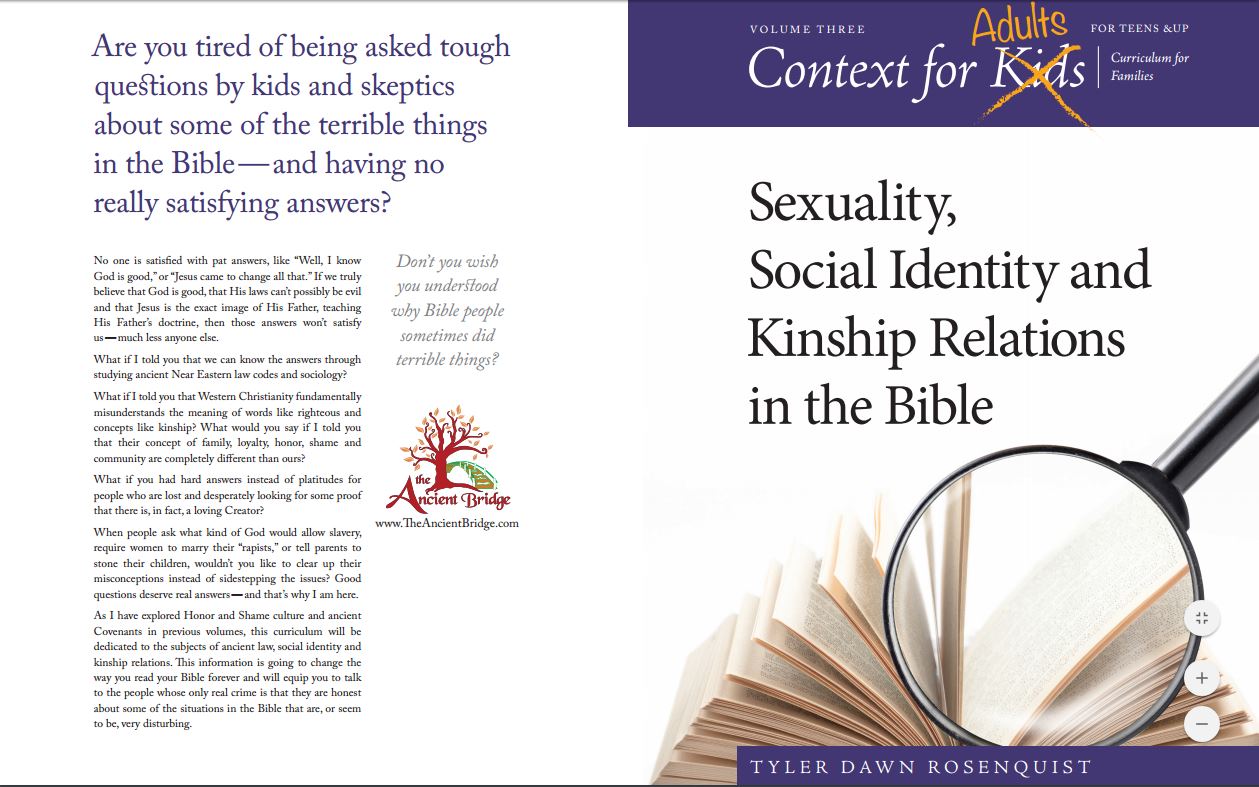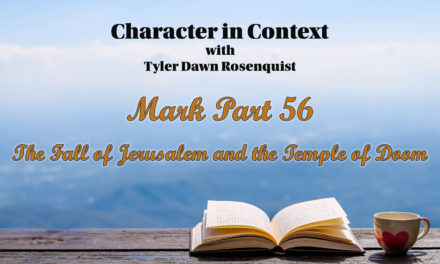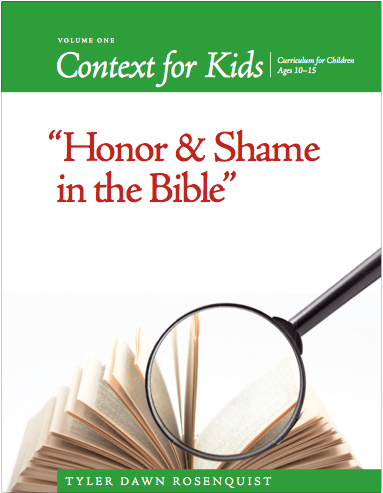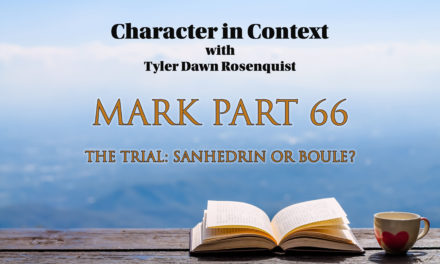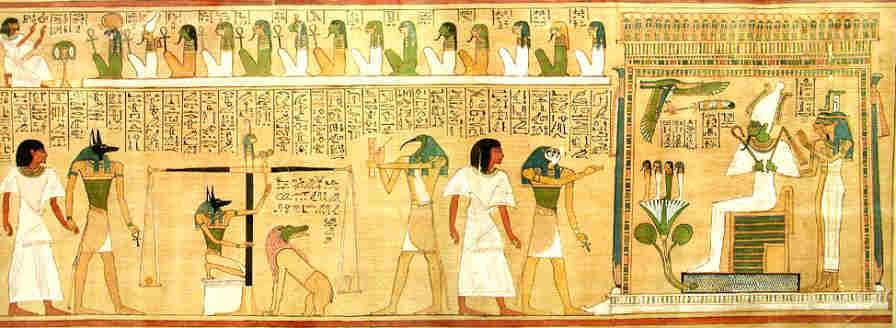 (Pictured: Weighing of the Heart/presentation of the dead to Osiris. From left to right, Anubis, god of embalming leading candidate to the scales; Anubis weighing the candidate’s heart against the feather of Ma’at’s truth and justice with Ammit waiting to devour the heavy heart of the unworthy as Thoth, god of wisdom and literacy, advises and records; Horus presents candidate to his father Osiris, god of the underworld, flanked by his wife Isis, and his sister Nephthys. The scene is much more complicated than I have presented, I just wanted to give you enough information for the context of today’s teaching)
(Pictured: Weighing of the Heart/presentation of the dead to Osiris. From left to right, Anubis, god of embalming leading candidate to the scales; Anubis weighing the candidate’s heart against the feather of Ma’at’s truth and justice with Ammit waiting to devour the heavy heart of the unworthy as Thoth, god of wisdom and literacy, advises and records; Horus presents candidate to his father Osiris, god of the underworld, flanked by his wife Isis, and his sister Nephthys. The scene is much more complicated than I have presented, I just wanted to give you enough information for the context of today’s teaching)
Ancient Near Eastern beliefs about the heart are always interesting to delve into because it clears up a lot of “huh?” verses in scripture that we were taught to simply write off as straight up metaphors and which have indeed shaped the metaphors and idioms that we now take for granted. This is the more grown up version of this week’s episode of Context for Kids where we talked about the hardening of Pharaoh’s heart as well as Aaron’s staff turning into a snake (or was it?). My goal is to equip entire families, and to provide grown ups and teenagers with the tools to go deeper into the study of Bible context.
Gen 6:5 And God saw that the wickedness of man was great in the earth, and that every imagination of the thoughts of his heart was only evil continually
Gen 8:21 And the Lord smelled a sweet savour; and the Lord said in his heart, I will not again curse the ground any more for man’s sake; for the imagination of man’s heart is evil from his youth; neither will I again smite any more every thing living, as I have done.
Jer 17:9 The heart is deceitful above all things, and desperately wicked: who can know it?
Jer 31:33 But this shall be the covenant that I will make with the house of Israel; After those days, saith the Lord, I will put my law in their inward parts, and write it in their hearts; and will be their God, and they shall be my people.
The people of the Ancient Near East were brilliant mathematicians and engineers, but they were not scientifically minded. What we attribute to science, they attributed to the workings of gods and goddesses – be it the sun in the sky or agriculture, there wasn’t a scientific explanation of natural phenomenon but instead a supernatural force working behind the scenes. As far as the human body went, they knew that the loss of enough blood meant death but as far as which bodily organs were responsible for what, they weren’t always really clear on the concept. As the Bible, from front to back, was serving not as a science book but as a revelation of His character in terms that His people could understand – God didn’t take the time to correct their flawed views of science any more than He corrects ours – let’s face it, scientifically we must still look like tots playing with tinkertoys. (I know this can upset people, but keep in mind that only within the past half-Millennium was a scientific mindset forced onto the Scriptures – before the Age of Reason people didn’t really look to the Bible as a source for scientific knowledge and only did so when society in general became scientifically focused and theologians decided that the Bible had to be scientific too in response to public pressure. We decided that science is important, not God – I am speaking here as a Chemist who used to work in R&D for an aerospace firm but it is God’s character, and not scientific truth, that is the pinnacle of wisdom and knowledge. I love science, but the Bible is about God and His plans, and what he desires to communicate dwarfs what we think we know about science)
From ancient writings we see it across the board – it was believed that the heart functioned as the center of thinking for the body, and not the brain. Really, they were so unimpressed with the brain in ancient Egypt that they chalked it up to little more than skull wadding. The brain was considered so irrelevant that priests removed it before mummification and threw it away as the least important part of the body and therefore unnecessary for eternal life. The heart, on the other hand, was the most carefully preserved and cherished organ.
The Egyptian Book of the Dead (which was not originally a book but instead paintings on tomb walls and coffins meant to provide the dead with the prayers and magic spells that would see them safely through the hazards of the realm of the dead) records the Egyptian belief that after death, a person’s heart would be weighed on a scale against the feather of Ma’at. If the evil within a man’s heart was heavier than the truth and justice of Ma’at’s feather, then Ammit would devour his heart and that was that – no eternal life. No one wanted a heavy heart!
Mummification was practiced for one reason and one reason alone – without an intact body, there could be no hope of eternal life – the Pharaoh would not join the ranks of his fellow gods in death. You know, it would actually be hecka hilarious if it actually did turn out that they were right about eternal life working out that way, because there would be a bunch of brainless zombie Pharaohs shuffling around like idiots in the afterlife.
Alcmaeon of Croton, in the 5th/6th century BCE was the first to suggest that the brain was the location of the mind – but by then of course, the Old Testament was already written. The “thinking heart” therefore is going to be our context for most of the heart verses in the Scripture and this brings us to the hardening of Pharaoh’s heart.
Repeatedly, we see references to Pharaoh’s heart being “hardened” in the Exodus account. John D Currid, in his book Ancient Egypt and the Old Testament, makes an interesting observation. There are three words translated in the plague accounts as hardened – qasah (to be difficult), chazak (to be strong) and kabed (to be heavy). Kabed is the word I want to focus on here:
Here is kabed used in Exodus:
5:9 “Let heavier work be laid on the men that they may labor at it and pay no regard to lying words.”
8:15 But when Pharaoh saw that there was a respite, he hardened his heart and would not listen to them, as the LORD had said.
8:32 But Pharaoh hardened his heart this time also, and did not let the people go.
9:7 And Pharaoh sent, and behold, not one of the livestock of Israel was dead. But the heart of Pharaoh was hardened, and he did not let the people go.
9:34 But when Pharaoh saw that the rain and the hail and the thunder had ceased, he sinned yet again and hardened his heart, he and his servants
10:1 Then the LORD said to Moses, “Go in to Pharaoh, for I have hardened his heart and the heart of his servants, that I may show these signs of mine among them
14:4 And I will harden Pharaoh’s heart, and he will pursue them, and I will get glory over Pharaoh and all his host, and the Egyptians shall know that I am the LORD.” And they did so.
14:17 And I will harden the hearts of the Egyptians so that they shall go in after them, and I will get glory over Pharaoh and all his host, his chariots, and his horsemen
So we see that although Pharaoh was the one to begin the process of making his own ‘heart’ heavy, God also helped the process along. Pharaoh was turning his mind over to more and more evil, and when we are intent on evil, God will give us up to our worst instincts – in Pharaoh’s case, his evil was such that it affected an entire nation. Responsibility has its consequences and when we use our authority to do evil our fall, when God decides to judge us, is generally going to be faster than it is for those who have very little influence over the lives of others. The language in this portion of scripture is clear for everyone who would have been reading it – Pharaoh’s heart was too heavy to survive the judgment. He was not worthy of merging with Osiris in death and taking his place among the gods. This wasn’t simply God shaming a king, this was God denying ‘god on earth’ his godhood. Through the plagues, Pharaoh was stripped of his self-proclaimed divine status in heaven and on earth.
As we will see in a couple of weeks, Pharaoh’s required mummification also hits a serious snag.
Interestingly kbd, the lemma of kabed, is also related to kbd – kavod (the b and v sounds are different forms of the same Hebrew letter bet) meaning glory, being heavy with honor and esteem. It was precisely that pursuit of his own honor/glory that spurred Pharaoh against God in the first place. His first recorded words in Scripture were, in fact, a direct challenge to God’s honor.
But Pharaoh said, “Who is the LORD, that I should obey his voice and let Israel go? I do not know the LORD, and moreover, I will not let Israel go.”
Pharaoh called into question the heaviness of God’s glory, and so God responded by proving the heaviness of Pharaoh’s evil mind.
All Scripture quotations from The Holy Bible: English Standard Version (2001). Wheaton: Standard Bible Society.



